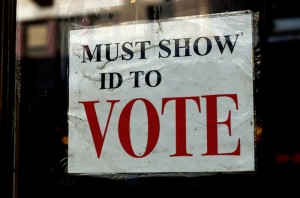Voter ID a hot topic in state legislatures

Voter turnout in the United States is disturbingly low. In the 2008 presidential election, voter turnout was higher than it had been in a generation, but barely 60% of eligible voters bothered to cast a ballot. In non-presidential election years, the numbers are even worse, with over 60% of eligible voters opting not to vote. Given these dismal numbers, one would think that states across the country would seek to implement policies that would encourage participation in the electoral process. Instead, the opposite appears to be the case, judging from the wave of voter identification laws that have swept across the nation in recent years.
Just ten years ago, laws requiring voters to provide a photo identification as a prerequisite to cast a ballot were virtually non-existent in the United States. Today, nearly 30 states now require all voters to show some form of photo ID. Since 2002, almost 1000 bills dealing with voter identification issues have been introduced in the legislatures of 46 states. Last year, voter ID bills were introduced in 34 states, leading the National Conference of State Legislatures (NCSL) to declare that “voter ID was the hottest topic of legislation in the field of elections in 2011.”
Those bills resulted in the passage of new voter identification laws in Kansas, Mississippi, Rhode Island and Wisconsin, and new restrictions requiring photo identification for all voters in Alabama, South Carolina, Tennessee and Texas. Similar laws were passed by the legislatures of Minnesota, Missouri, Montana, New Hampshire and North Carolina, but were vetoed by the states' governors, according to the NCSL.
In late December, the Department of Justice blocked the implementation of the new law in South Carolina, stating that it would suppress turnout among minority voters. Fearing a similar fate for its voter ID legislation, Texas filed a federal lawsuit last week demanding that it be allowed to implement the new law. The Voting Rights Act requires that states and jurisdictions with a history of voting rights violations obtain pre-clearance from the Department of Justice before instituting changes to their elections laws
Supporters of voter identification laws argue that they are necessary to prevent voter fraud. Opponents charge that the new laws are an effort to suppress minority voter turnout. The Brennan Center for Justice at NYU's School of Law reports that over 10% of eligible voters do not possess any form of government-issued photo identification, and restrictive laws would disproportionately affect some of the most vulnerable segments of the electorate. According to the Brennan Center:
“That percentage is even higher for seniors, people of color, people with disabilities, low-income voters, and students. Many citizens find it hard to get government photo IDs, because the underlying documentation like birth certificates (the ID one needs to get ID) is often difficult or expensive to come by.”
It is not difficult to fathom why state legislatures would favor tightening voter identification laws in their efforts to ensure the integrity of elections. They shift the burden from the government to would-be voters. Yet, voter fraud appears to be much less of a problem than voting irregularities resulting from faulty voting machines and equipment.
The Brennan Center states that “there is no documented wave or trend of individuals voting multiple times, voting as someone else, or voting despite knowing that they are ineligible,” and that “many vivid anecdotes of voter fraud have been proven false or do not demonstrate fraud.”
Irregularities resulting from faulty voting machines, on the other hand, are well-documented and more widespread than many would like to admit. An independent audit of the November 2010 general election in South Carolina organized by the League of Women Voters of South Carolina found “enormous room for improvements” to the state's elections process. Among other things, the audit found widespread failure of electronic voting terminals and no official procedures for “dealing with votes collected on machines that report their data to be unreliable.” More shockingly, the state's counties proved incapable of even providing consistent data files to the team of investigators, leading them to question the viability of the state's election system.
“The fact that the counties cannot produce repeatable and consistent audit files should be a cause for concern about the usability of the election system in South Carolina,” states the report.
Similar systems are in use in states across the country, thus seemingly revealing the absurdity of tackling voter fraud as a means of ensuring the integrity of our elections. If our votes are not counted properly or not even counted at all, the alleged existence of widespread voter fraud is a moot point.




